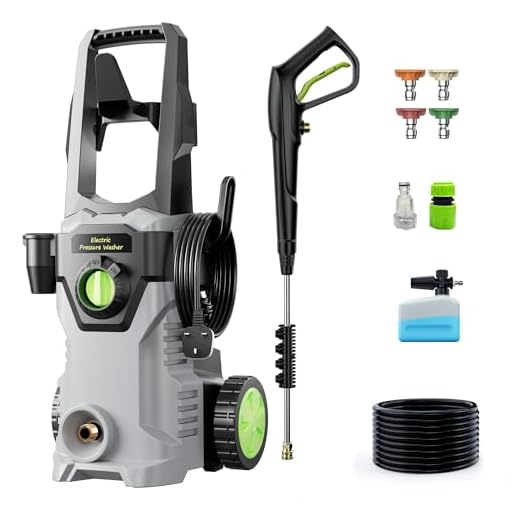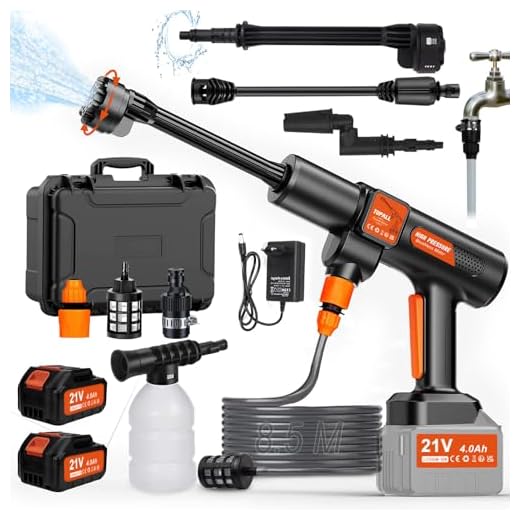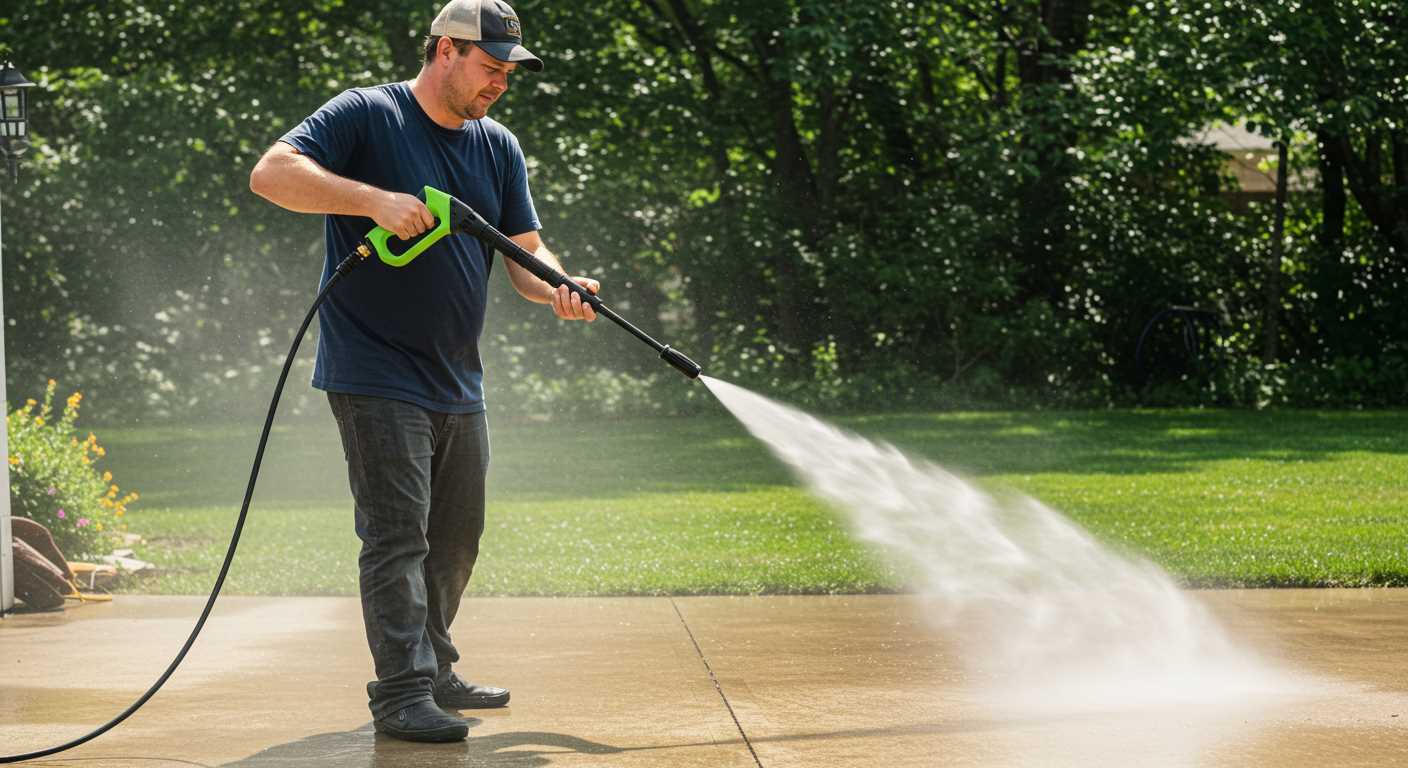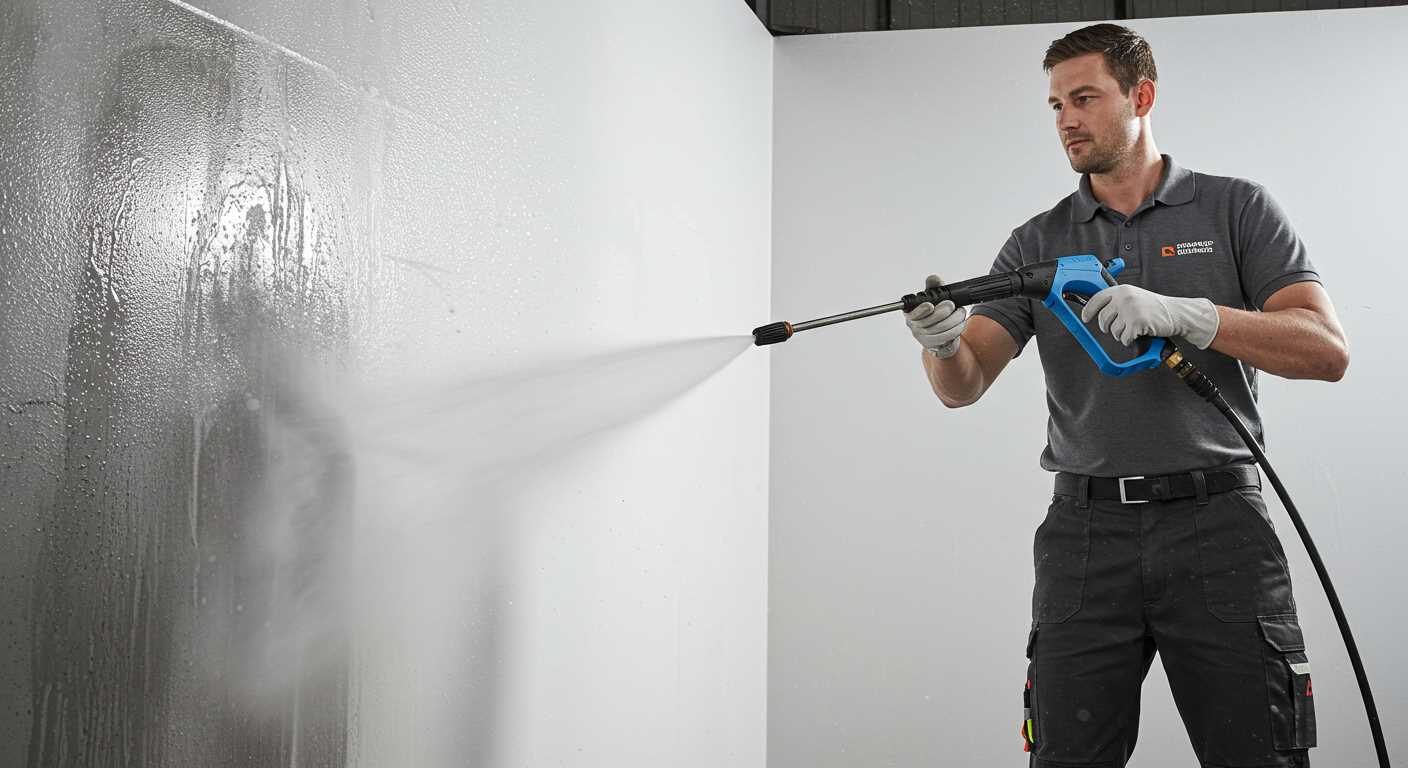



If you’re seeking a reliable solution to restore the shine of your driveway, consider the Simpson Cleaning MSH3125 MegaShot. With a Honda engine providing 3100 PSI and 2.5 GPM, this unit excels at tackling grime, oil stains, and general discolouration. Its lightweight design and ergonomic handle make it easy to manoeuvre, ensuring a thorough clean without unnecessary fatigue.
For those who prefer an electric alternative, the Sun Joe SPX3000 delivers an impressive performance at 2030 PSI and 1.76 GPM. This compact model is perfect for residential use, offering onboard storage for accessories and a total stop system that prolongs motor life. It effectively handles everything from dirt to grime, making it a solid choice for maintaining your hard surfaces.
When considering your budget, the Greenworks GPW1501 is a fantastic entry-level machine. With a power output of 1500 PSI, it’s well-suited for light-duty tasks around your home. Its easy setup and lightweight structure make it accessible for everyone, providing a manageable way to keep your driveway clean without breaking the bank.
Top Features to Look for in a Driveway Pressure Washer
High-pressure cleaning devices that excel in driveway maintenance should possess specific capabilities. Here are key attributes to evaluate:
Water Pressure and Flow Rate
- Opt for models delivering at least 2500 PSI. This pressure effectively tackles stubborn grime and oil spots.
- A flow rate of 2.5 GPM or higher ensures efficient cleaning and quicker task completion.
Type of Motor
- Electric motors are quieter and require less maintenance–a great choice for residential use.
- Gas engines offer higher power, suitable for large areas with heavy build-up.
Detergent Compatibility
Ensure the unit supports various cleaning solutions. A unit with a soap nozzle can enhance cleaning when tackling oil and grease.
Nozzle Options

- Interchangeable nozzles provide versatility; a wider angle for rinsing and a narrow one for stripping stubborn dirt.
- A turbo nozzle is excellent for fast and effective cleaning on rough surfaces.
Durability and Build Quality
- Look for models made of solid materials such as brass fittings and high-quality plastics to withstand regular use.
- A sturdy frame enhances portability while ensuring longevity.
Wheels and Mobility
Large wheels facilitate manoeuvrability over uneven terrain, making the device easy to move across various surfaces.
Storage Options

- Cable management systems and onboard storage for accessories simplify packing and unpacking.
- Compact designs can save space when not in use.
By focusing on these characteristics, you can select a unit that meets performance needs and ensures a consistently pristine driveway. My decade of experience in the industry has shown that investing in a robust and feature-rich model pays off in both efficiency and results.
Comparing Electric vs. Petrol Pressure Washers
For concrete surfaces, electric models often suffice. They are quieter, lighter, and easier to maintain. Typically, they range from 1300 to 2100 PSI, making them suitable for routine cleaning tasks like removing dirt, oil stains, and algae. Electric machines can usually handle residential tasks effectively and are perfect for those who prefer convenience and reduced noise levels.
Conversely, petrol variants deliver higher pressure ratings, often exceeding 3000 PSI. This power makes them ideal for heavy-duty applications, particularly if you encounter stubborn stains or large areas needing significant cleaning. However, they require more upkeep and can be noisier and heavier, impacting manoeuvrability.
One critical factor when choosing is the cleaning capability related to water flow rate. Electric units generally have lower GPM (gallons per minute) rates, which may extend cleaning time. In contrast, petrol machines often have higher GPM values, enhancing efficiency for larger tasks.
Energy source also plays a role in usage preferences. Electric versions offer the convenience of being plug-and-play; you won’t have to deal with fuel storage or mixing oil. On the other hand, petrol options may suit those who need to operate in remote areas without access to power sources, providing greater flexibility.
Cost is another consideration–electric cleaners tend to be more budget-friendly upfront, while petrol models may require a more significant initial investment. However, weigh long-term costs, maintenance, and fuel expenses before making a decision.
In conclusion, your choice should reflect specific needs, the size of your area, and frequency of use. Whether you opt for electricity or petrol ultimately hinges on these parameters. Make sure you assess the demands of your cleaning tasks to select the right model for optimal results.
Best Pressure Washer Brands for Driveway Cleaning

When selecting a reliable machine for tackling stubborn driveway stains, brands with a proven track record shine. Among the leaders, Karcher is renowned for its German engineering and durability. Their models often feature advanced nozzle technology, making them exceptionally effective against grime and debris on asphalt and concrete.
Sun Joe has also gained my trust due to its lightweight electric units, which provide excellent performance for residential use. They offer a balance of power and affordability, making them ideal for homeowners who want convenience without sacrificing results.
Moving on, Honda deserves mention for its petrol units. Their engines are known for robust reliability, delivering impressive power and longevity. Ideal for larger driveways or demanding tasks, these machines handle heavy-duty jobs with ease.
Another brand worth considering is Generac. Their offerings range from electric to petrol models, featuring ergonomic designs and user-friendly controls. I’ve found their products particularly effective in improving the user experience while maintaining excellent cleaning capability.
Ryobi stands out in the electric segment with good customer ratings for performance and ease of use. With various attachments available, their models can tackle a range of surfaces, enhancing versatility for different cleaning tasks.
Lastly, Briggs & Stratton excels in petrol-powered options. Known for their reliability and powerful engines, they’re a popular choice among those who frequently deal with heavy-duty jobs. Their simple maintenance requirements add to their appeal.
Based on extensive experience, these brands consistently deliver quality machines that make driveway clean-up efficient and effective. As you explore options, consider your specific requirements, such as power needs and frequency of use, to ensure the right fit for your cleaning projects.
Understanding Pressure Ratings and Their Importance
When selecting a cleaning unit, understanding pressure ratings is paramount. The measurement of pressure, usually indicated in psi (pounds per square inch), dictates how effectively a machine can remove stubborn grime and debris. For removing concrete stains, a rating of at least 3000 psi is advisable. Higher ratings can lead to faster cleaning and improved results.
How Ratings Impact Cleaning Performance
A unit with lower pressure may struggle against tough spots, while excessive pressure can damage delicate surfaces. It’s pivotal to match the pressure rating with the task at hand. Here’s a simplified breakdown of the typical pressure ratings and their applications:
| Pressure (psi) | Best Used For |
|---|---|
| 1300-1900 | Light cleaning tasks (wood, car washing) |
| 2000-2800 | Medium tasks (driveways, patios) |
| 2800-4000 | Heavy-duty cleaning (concrete, brick) |
The Role of GPM in Overall Efficiency

Another critical aspect is the flow rate, measured in GPM (gallons per minute). A higher flow rate coupled with appropriate pressure enables thorough rinsing and reduces cleaning times. For optimal performance, consider a combination of high psi with good GPM for effective grime removal.
Accessories that Enhance Driveway Cleaning
Investing in the right add-ons can significantly improve results when tackling tough stains or grime on your surface. Here are some key accessories you should consider:
Surface Cleaner: This attachment makes short work of large areas, achieving uniform results while reducing cleaning time. Designed with rotating nozzles to provide even coverage, it’s perfect for concrete, paving stones, and asphalt.
Turbo Nozzle: A turbo nozzle is invaluable for tackling stubborn dirt and spills. It combines a rotating jet with high pressure, giving you the power to remove embedded debris without the risk of damaging the surface.
Detergent Injector Kit: If your cleaner allows for detergent use, consider investing in a detergent injector. It enhances cleaning by mixing soap with water, breaking down grime and making it easier to wash away. Just ensure you’re using a suitable detergent for your specific models.
Extension Wands: These longer wands are helpful for reaching tough spots without straining. Ideal for areas like corners or underneath vehicles, they provide additional versatility during cleaning sessions.
Brush Attachments: A brush can be particularly useful for surfaces that need scrubbing. These attachments can help lift dirt that might otherwise remain after washing, making it easier to achieve a pristine finish.
Wheel and Lifting Kits: If portability is a priority, consider wheel kits or lifting frames. They facilitate easier movement of the unit, especially on uneven terrain, ensuring you can clean every section without hassle.
Utilising these accessories will optimise your cleaning process, making it more efficient and accessible, while enhancing the overall results. Choose wisely according to your specific needs and surface types for maximum impact.
Cost Considerations: Budgeting for Your Cleaning Equipment
Establishing a budget begins with defining your needs. Expect prices to vary significantly based on features, power source, and brand reputation. Here’s a breakdown to guide your financial planning:
- Entry-Level Models: These usually range from £100 to £250. Suitable for light cleaning tasks like patios and garden furniture, they often come with basic functionality.
- Mid-Range Options: Priced between £250 and £500, these units offer more power and additional features such as adjustable nozzles and higher pressure levels, making them ideal for more challenging tasks.
- High-End Machines: Starting from £500 and going up to £1,000 or more, these models provide professional-grade performance. Ideal for frequent users or those handling tough jobs like stripping paint or deep cleaning oil stains.
In addition to the initial purchase, factor in:
- Maintenance Costs: Regular upkeep can range from £50 to £150 annually, depending on usage and maintenance frequency.
- Accessories: Expect to invest an additional £20 to £100 on attachments such as brushes, surface cleaners, and extension wands that enhance cleaning efficiency.
- Cleaning Solutions: Budget around £10 to £50 for detergents, especially if you’re tackling stubborn stains or grime.
Assessing the total cost over the lifespan of your unit can help in understanding the true investment. Prioritising quality will often lead to lower expenses in the long run, as a durable model tends to require less frequent repairs or replacements.
Consider purchasing during sales or clearance events. Brands often release new models, prompting discounts on older inventory. Ensure your choice not only fits your wallet but also meets your cleaning demands effectively to maximise value for money.
Maintenance Tips for Longevity of Your Pressure Cleaner
Regular inspections are vital. Check hoses and connections for any signs of wear or damage, replacing any that exhibit issues. This simple step prevents leaks and ensures optimal performance.
Flush the machine after use. Run clean water through it to remove detergent or debris that might cause clogs or corrosion over time. This practice keeps internals clean and functional.
Storage Practices
Keep in a dry, sheltered area to avoid moisture-related damage. Extreme temperatures can also affect functionality, so aim for a stable environment. Detach and store hoses and accessories neatly to prevent tangling and kinks.
Routine Servicing
Follow manufacturer guidelines for periodic servicing. Replace oil or clean filters as suggested to maintain efficiency. Performing these tasks helps extend the life of components significantly.










